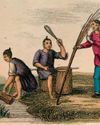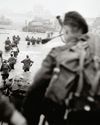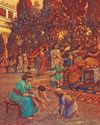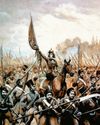Hero Or Villian? - Margaret Thatcher
Admired and reviled in equal measure, was Britains first female Prime Minister a heartless Iron Lady or revolutionary reformer?

Almost 30 years since she was last in power, Margaret Thatcher remains a divisive figure in Britain. Some see the Prime Minister as having saved the country from economic decline, others believe she destroyed the livelihoods of millions of workers. Neither side can deny that Thatcher became a icon in her own lifetime through sheer force of cast-iron will.
Born Margaret Roberts in 1925, she grew up living above her parents’ grocery shop in Grantham, Lincolnshire. Her childhood was comfortable, but a far cry from the aristocratic origins of many Conservative leaders and Prime Ministers. But the influence of her father’s role in local politics and her own self-belief were to change all that.
Displaying an early determination for hard work and self-betterment, she won a scholarship to the local grammar school. From there, she went on study chemistry at Oxford, where she also became one of the first women presidents of the university’s Conservative association.
After graduating 1947, she worked as a research chemist. In 1951, she married wealthy industrialist Denis Thatcher, who supported her political ambitions. But her rise to power was far from meteoric. Her first two attempts to become a Member of Parliament (MP) failed. From 1952, Thatcher even put politics aside for a time, first to train as a barrister, then to have children.
When she was finally elected in 1959, she was one of just 25 women MPs out of 630 in the House of Commons. Post-war British politics remained a boy’s club and she routinely faced prejudice, not just from the Conservative Party rank and file, but the leadership. Though she was a proven orator, only a number of low-key junior ministerial roles followed. Undeterred, she bided her time.
This story is from the Issue 69 edition of All About History.
Start your 7-day Magzter GOLD free trial to access thousands of curated premium stories, and 9,000+ magazines and newspapers.
Already a subscriber ? Sign In
This story is from the Issue 69 edition of All About History.
Start your 7-day Magzter GOLD free trial to access thousands of curated premium stories, and 9,000+ magazines and newspapers.
Already a subscriber? Sign In

MADE IN CHINA 10 GREATEST CHINESE INVENTIONS
Ancient China was a melting pot of advanced technologies and ingenious innovations

CHARLES LUDLAM AND THEATRE OF THE RIDICULOUS
How one man helped shape a bawdy, extravagant underground movement into a theatrical phenomenon

What If...NIXON HAD WON THE 1960 ELECTION?
John F Kennedy's presidency was defined by several crises. If Richard Nixon had been elected, how would he have handled these events?

DEPOSED KINGS
Discover the unfortunate monarchs prematurely kicked off the throne

THE SPANISH CRUSADER El Cid
How a Castilian knight fought Christians and Muslims alike to become a national icon

Artemisia PIRATE PRINCESS OF HALICARNASSUS
Praised by Herodotus, what do we really know about the woman who stood with Xerxes against the Greeks?

SWORD BEACH
QUISTREHAM, FRANCE 6 JUNE 1944

WHAT DID THE BABYLONIANS EVER DO FOR US?
Professor Marc Van De Mieroop discusses the legacy of ancient Babylon, from cuneiform to culture

REVOLUTIONARY WOMEN
Discover some of history's most extraordinary female rebels and freedom fighters

A WEAPON FOR ABOLITION
Stephen Taylor recounts the story of HMS Black Joke and the West Africa Squadron's fight to stop slavery
